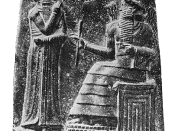Legal systems are one of the essential parts of having a major civilization. With legal system rulers are able to control the masses while keeping a controlled status. With these commoners are aware of what are the consequences if they do not follow the determined set of laws. Most of the ancient civilizations legal systems were based in a totalitarian form of rule, meaning that one single person had supreme power over everyone. Such was the case for Egypt, but not for Mesopotamia which had less distinct social hierarchies. Although ancient legal systems are considered inhumane, it is clear that both the legal systems of Egypt and Mesopotamia were necessary in order to maintain stability and control of the population.
Egyptian laws are based on the principle of common sense. Instead of having such a rigid law system the Egyptians opted on following the codes based on the concept of ÃÂMaÃÂat.ÃÂ
The MaÃÂat represented order, balance, truth, and justice in the universe. This allowed that anyone except for slaves and nobles were seen as equal by law. Although the Egyptians tried to express equality through their laws, it was the Pharaoh considered as a living god who was the supreme judge and lawmaker whom had the supreme authority over everyone. This meant that Egypt would so be called today a totalitarian form of government. Furthermore, it was men with the exception of some women that had complete authority over the legal system. Usually after someone died, property was often divided between the male and female children. Most of the laws were based on ÃÂcause-and-effectÃÂ due to the fact that if you committed a crime you were often had to complete a punishment that by todayÃÂs standard would be inhume. Although legal systems in Egypt were a not fair they set...



Legal systems, their development, uses and importance in Egypt and Mesopotamia
This essay mistakes naked power for law. Early rulers such as the pharaohs of Egypt and the rulers of ancient Mesopotamia did not have what could accurately be called law: they had power. Law came into being when the rulers accept some sort of restraint on the power of the powerful to use brute force over the weak. (In this sense, the Hebrew rule of an eye for an eye was a tremendous moderation since before that rule came into play, there were few limits on the retaliation that was allowed.)
The essay also repeatedly makes assertions such as "it is clear that both the legal systems of Egypt and Mesopotamia were necessary in order to maintain stability and control of the population." But the essayist offers no discussion of the point, no supporting evidence, nothing showing the basis on which he makes this claim.
The breakthrough of the Code of Hammurabi was that it prescribed limits to the use of power. By prescribing a code, Hammurabi limited his own power, agreeing to follow certain rules. While those rules may have been crude by contrast to what we now expect from our rulers, the significance was that he acknowledged that there would be some limits to his power. This was the essence of law.
2 out of 2 people found this comment useful.